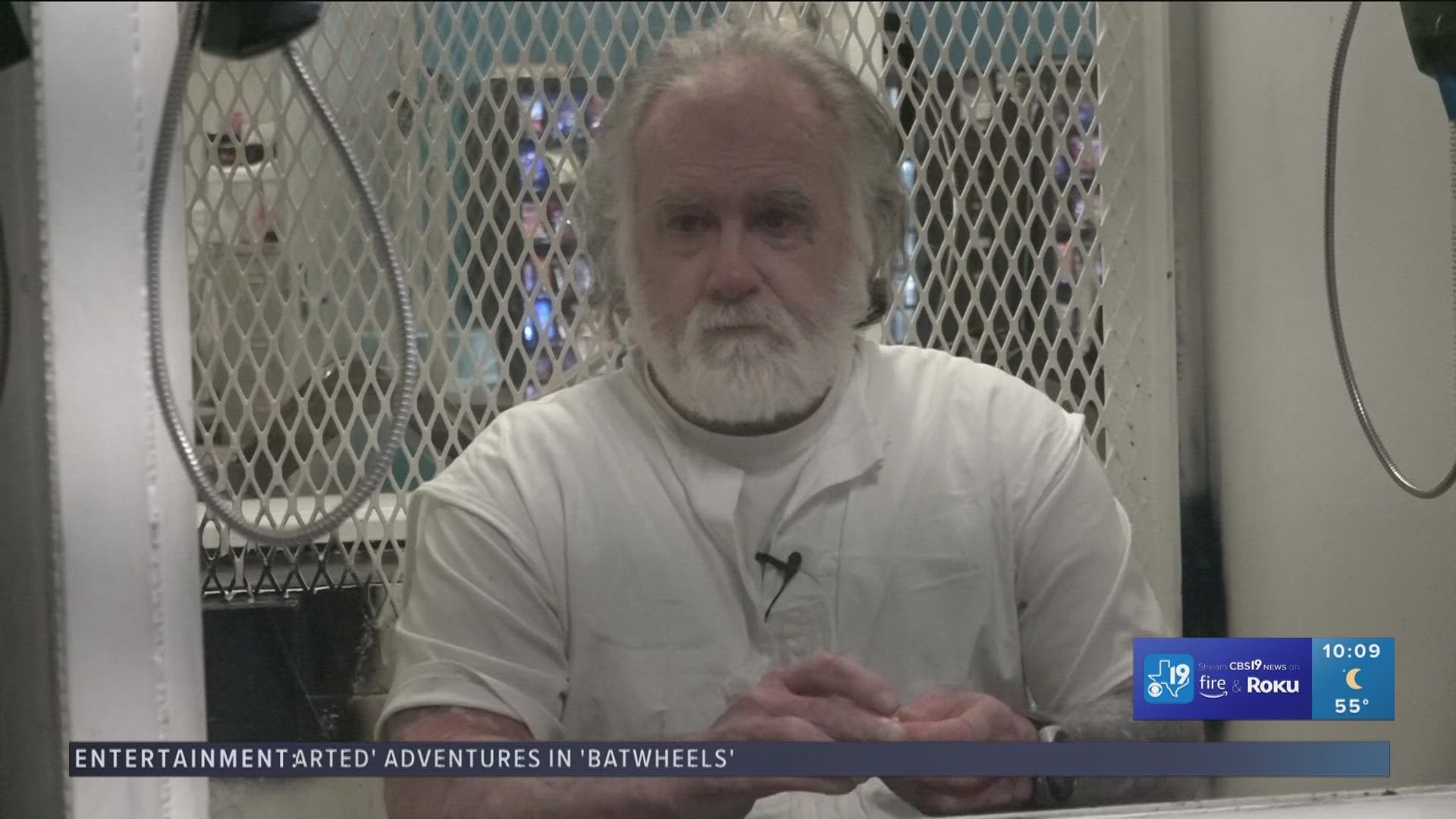WHITEHOUSE, Texas — A Whitehouse man sentenced to death for murdering his mother in 2003 filed a lawsuit last Friday claiming that his upcoming execution in early November could be unconstitutional due to improper mental health evaluations.
Tracy Beatty, 61, has been on death row since he was sentenced to death in August 2004 for the capital murder of his mother Carolyn “Callie” Ruth Click, who he strangled and later buried in the backyard.
The lawsuit claims that Beatty has not been given the chance to have mental evaluation without wearing handcuffs while in prison.
Those named in the lawsuit are Bryan Collier, Texas Department of Criminal Justice executive director; Bobby Lumpkin, TDCJ Correctional Institutions Division director; and Daniel Dickerson, senior warden of the Polunsky Unit in Livingston, where Beatty is imprisoned.
His attorney states throughout the lawsuit that the handcuffs prevent doctors from performing a full assessment to determine whether or not Beatty has an intellectual disability.
Those who have an intellectual disability cannot be executed under the 8th Amendment through the 2002 Supreme Court ruling Atkins v. Virginia.
In September, Dr. Bhushan Agharkar and Dr. Daniel Martell provided mental health evaluations for Beatty.
In Agharkar's evaluation, the doctor said that Beatty is "clearly psychotic and has a complex paranoid delusional belief system.” The lawsuit claims that Beatty believes a conspiracy of correctional officers "torture" him using a device in his ear for him to "hear their menacing voices.” Agharkar also found that Beatty thinks the officers, including those who aren't in the prison, "read and broadcast" his thoughts to others.
In the lawsuit, it's noted that Agharkar couldn't administer valuable neurological tests because Beatty was handcuffed.
The document also lists "red flags" showing Beatty has a need for mental health evaluations, such as being taken to a prison typically for those who are severely mentally ill, getting struck in the head with a baseball bat at age 8 and taking drugs for bipolar mania.
He's also receiving treatment for Darier Disease, a rare skin condition that experts say can cause significant impairment of cognitive functioning, the lawsuit explained.
According to the lawsuit, prison officials have claimed that a court order is necessary for inmates to receive an evaluated with handcuffs. The document notes that this has not been required for every inmate "with an execution date."
"Their treatment of Mr. Beatty is arbitrary, capricious, and inconsistent with their treatment of other death row inmates approaching their execution," the lawyer writes in the document.
TDCJ officials have allowed inmates, other than Beatty, to be uncuffed with approved representatives for neuropsychological, neuropsychiatric and medical evaluations, the lawsuit claims.
Beatty's lawyer team also said blocking an evaluation, in which he is uncuffed, hinders his ability to present evidence that his death sentence should be commuted or reduced.
The lawsuit states Beatty applied for clemency, a process in which a governor, president or administrative board reduces a sentence or gives a pardon, on Oct. 19.
"Defendants’ actions have prevented Mr. Beatty from identifying information relevant to his mental health and brain functioning that could form the basis of viable legal claims," the document reads. "Individuals who are intellectually disabled are exempt from execution under the Eighth Amendment."
While other death row inmates have been allowed to have uncuffed visits, the lawyer said Beatty is being deprived of his "constitutional right to equal protection of law."
Beatty's lawyers are seeking a judgement stating the prison officials' actions violate Beatty’s constitutional and statutory rights.
They also want to an order to stop Beatty's execution until Agharkar and Martell can evaluate him without being handcuffed, and until Beatty has time to use the results for his clemency application and other litigation.
BACKGROUND
According to previous reports from the Tyler Morning Telegraph, Beatty killed his mother Callie Click two days before Thanksgiving 2003. She had told him to move out of her home, where he was staying after serving prison time for intentionally injuring his 18-month-old niece.
Beatty and Click had a tumultuous relationship but witnesses said she had forgiven him when he came to her home in October, the Tyler Paper reported.
In addition to strangling his mother, Beatty beat her badly, broke her bones and injured her head. He burned her items, stole her car and used credit cards to buy drugs and alcohol, according to court records obtained by the Tyler Paper.
According to the Morning Telegraph, Beatty was arrested in Henderson County on auto and theft charges and he told inmates he killed his mother. He asked investigators to let him guide them to Click's body to “get her out of the hole before Christmas."
"On Dec. 23, 2003, cadaver dogs found her nude, contorted body in a small, shallow grave behind her pale yellow trailer in Whitehouse," the Tyler Paper article read.
The newspaper said Beatty buried her with mothballs and garlic, covered her with cat litter and lumber, and tied panty hose over her neck and face.
During the trial, psychiatrists said Beatty's behavior was consistent with "lifelong condition of "anti-social personality disorder," but he was not mentally ill, according to the Morning Telegraph.
TDCJ Communications Director Amanda Hernandez said in an email TDCJ has "no comment due to pending litigation."
RELATED: East Texans on death row

